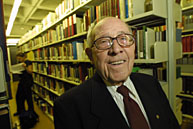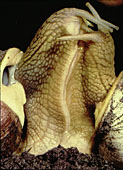Kaleidoscope
Stanley Frost: A cool look at history
 Photo: Owen Egan
Photo: Owen Egan |
|
Forty-seven years ago, Stanley Frost was a professor at the University of Bristol when he received a telephone call from Cyril James, inviting him to London to have lunch at the posh Atheneum Club. Frost — who is also an ordained minister — recognized the meeting with the then McGill principal as a poaching attempt. At 43 with a young family and a promising career in England he wasn't interested. Later a letter arrived from Canada, inviting him to visit McGill and see how he liked it.
"I said to my wife 'here's a chump that's going to pay for my fare across the Atlantic,' and she said 'well you get a free trip,' so I came across," recalled Frost.
Something about McGill and Montreal struck a chord with the professor of biblical languages, and he returned home to tell his wife and two children that he wanted to take the job.
"I never regretted it, and my family has never regretted either," he said.
In addition to a love for the university that was enough to cross an ocean for, Frost's career at McGill has given him a perspective on the workings of the school that have informed the various volumes he has produced as the Director of the McGill History Project.
Shortly after assuming his duties in what was then the School of Divinity, Frost was made dean of the school, when his predecessor became moderator of the United Church of Canada. His next promotion came under much more tragic circumstances.
"The vice-principal David Thompson, who was greatly loved at the university and admired as a Renaissance man, slipped and hit his head and went into a coma," said Frost. Cyril James asked Frost to temporarily take Thompson's place as dean of graduate studies, a job that became permanent on Thompson's death.
"If ever you want a job at a university, that's the one. It's marvelous," he said, "It really gives you a bird's eye view of all of the faculties and what they do."
Later, he became vice-principal (administration). Through it all, he saw great changes at McGill — the democratization of the institution, which he credits in part to the student activism of the 1960s and '70s. Another was rationalizing the pay of non-academic staff, a process Frost helped guide in the '60s and of which he is still proud.
"The discrepancies were huge. Pay for female staff was atrociously low. We decided to turn the non-academic staff into a kind of civil service, where if you were hired you had some reasonable expectation of moving up," he said.
Now nearing mandatory retirement age, Frost was asked by Principal Robert Bell to undertake a new project.
"Bob said to me what this university needs is a history — there's a fellow who did one in 1921, but it's a miserable thing and that's all we have," said Frost.
With a bequest from former Principal Cyril James, Frost set up shop in the McLellan Library. From there he wrote the two volume history For the Advancement of Learning: McGill University 1801-1971 (in which, modestly "S.B. Frost" appears in the text only once), and biographies of James McGill and Cyril James, for which he had access to the former principal's diaries.
Frost explained that James — who was a "one-man show" — left anything that had to do with women in the capable hands of Muriel Roscoe, the warden of the Royal Victoria College. The two had weekly dinners, which set tongues wagging on campus. Idle gossip, said Frost.
"The diary left it in no doubt that he was just as cold to her as he was to everyone else."
James may have been cold, but Frost is very warm on one subject: poetry. He's been an enthusiast since he was a boy. He's especially fond of the Great War poets who spoke to him in his youth. Giants like T.S. Eliot, W.H. Auden and Ezra Pound didn't impress him
"If you have to struggle all that hard to figure out what the man is talking about you might as well turn your attention elsewhere."
His own poems tend towards the changing of the seasons and festivals, as well as poems that explore religious themes. His poetry had previously only been distributed among friends (although his first piece was published in the Reporter as a response to the Ecole Polytechnic massacre). Now some have been collected for Fontanus, the library's annual monograph series.
As he's soon leaving the university, the time seems right to ask if he has a favourite memory of the place. Many: lunches at the faculty club, the majesty of convocations on Lower Field, delivering a great lecture.
"The university is a kaleidoscope, a constantly changing pattern of memories and events," he said. Sounds like that could be in a poem.
Autumn Harvest: Selected Poems by Stanley Brice Frost will be launched at an open meeting of the James McGill Society in the Faculty Club, accompanied by a lecture by Stanley Frost "McGill as I have Known Her." Vernissage 4:30, presentation 5:30. The date, February 17, will be Rev. Dr. Frost's 90th birthday.
 |
||||
|
I'd never found a veggie burger I liked. |
||||
Love Hurts: Snails make a point with a loaded "love" dart
Valentine's Day is upon us once more. In a quiet third floor laboratory of Stewart Biology, garden snails (Helix aspersa) are courting in slow-motion. The snails belong to McGill Biologist Ron Chase, who has spent the past 30 years using these organisms as subjects for his study of neurobiology, behaviour and evolution. Snail reproduction is a curious tale. Snails are hermaphrodites, but although individuals contain both male and female sex organs, they do not self-fertilize. The 2 to 6 hour marathon session that is snail copulation is actually an exchange of sperm between two individuals, combined with plenty of rubbing, biting and "eye-stalk" waving. Individuals use the received sperm to fertilize their own eggs -- a process that is necessary to maintain genetic diversity in the population.
 |
|
What makes some snail species particularly interesting to Chase is their use of "love" darts during copulation. About one third of snail species manufacture hard, sharp darts which they "fire" at the object of their affections (i.e. other snails). Snails manufacture love darts from calcium carbonate, the same material that they use to build their shell. The dart apparatus itself is located in a multifunctional genital pore which also serves as home for the snail's penis, a receptacle for received sperm and a release point for fertilized eggs.
"Love dart snails were known to the ancient Greeks, and it wouldn't be surprising to find that they influenced the creation of the cupid myth," said Chase, "It was incorrectly believed that these darts were a nuptial gift of calcium -- a major constituent of snail shells -- from one snail to another. Like a bunch of flowers or a box of chocolates in humans," he explained. "Another belief was that the dart was intended to arouse the receiver and indicate the shooter's readiness to mate." Research conducted by Chase has uncovered the real reason for dart shooting in snails, and the truth is much more sinister than previously thought.
Snails that have a way of ensuring that their sperm, rather than another's, is used to fertilize eggs and sire more offspring. Received sperm is moved to a storage area within the female reproductive system where it is used to fertilize eggs over a period of months or years. However, many sperm fail to reach the safety of the storage area and are instead digested in great numbers en route. Research conducted by David Rogers, a former graduate student of Chase now studying at University College London, revealed that of the millions of sperm received by a snail, only 0.025% actually survive. Love darts contain mucus that temporarily contracts a part of the female reproductive system in a way that allows a greater number of sperm to reach the storage area and survive; In short, "He shoots, she stores."
According to Chase, being hit with a love dart may increase the survival of sperm, but fortunately for some snails it is not essential for copulation. "Poor shooting is commonplace -- one third of all love darts either fail to penetrate the skin or they miss the target completely." Being hit with a love dart may sound cute and comical, but for the recipient, love darts are the equivalent of being stabbed with a hypodermic needle. Since snails are hermaphroditic, each snail possesses the love dart apparatus and copulating pairs are commonly seen jostling, in an attempt to hit but not be hit. All is fair in love and war.
 |
||||
|
Losing hope in a better life is a tragedy for our young people and makes them easier targets for extremists. It's worth the cost if you make one young man believe he can have a better life. |
||||

